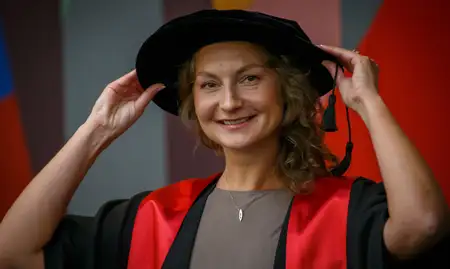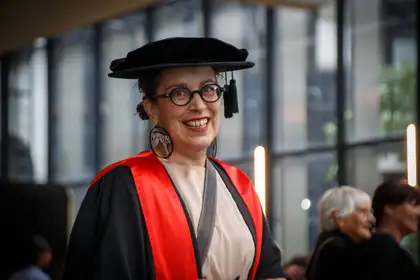
Dr Rebecca Ora.
Her research explored the critical engagement with settler narratives and the reimagining of her relationship to land in Aotearoa New Zealand. Born in Palmerston North and raised in Feilding, the 52-year-old now resides in Titahi Bay, Porirua.
At the core of Dr Ora’s research is the concept of ‘unsettling’—a creative and reflective exploration of decolonisation through performance and video. It draws on the idea that landscape, as a Western cultural construct, has normalised the presence of settlers in Aotearoa, like herself.
Dr Ora says through her art practice she aimed to engage with land in a way that unsettles these colonial narratives. Her work critiques colonial and patriarchal representations of land, embodying a shift away from ownership and control, towards a relational, non-grasping understanding of being on land.
As a Pākehā woman and descendant of settler farm labourers, Dr Ora sought to rethink her relationship with the land in ways that challenge colonial ideals and open new possibilities for engagement.
Through everyday, playful actions like vacuuming a paddock or attempting to climb an electric fence, she disrupts the settler identity and reflects on her own decolonising process. Dr Ora’s work is informed by feminist and decolonial theorists such as Linda Tuhiwai Smith, Maria Lugones, Donna Haraway, and Eduardo Glissant.
She says much of her work was shaped by the Manawatū landscape, where her forebears arrived in the 1800s under the colonial ideology that Māori land was empty and unused.
“This land was never empty. It was a rich and complex food source and travel route, managed by iwi and hapū. In stepping into these landscapes through performance, I placed my body into this layered history, using a static camera to highlight how I move through and against it,” she explains.
Dr Ora’s performances, captured in video form, invite viewers to think of land not as something to own, but as a living entity with its own agency and history.
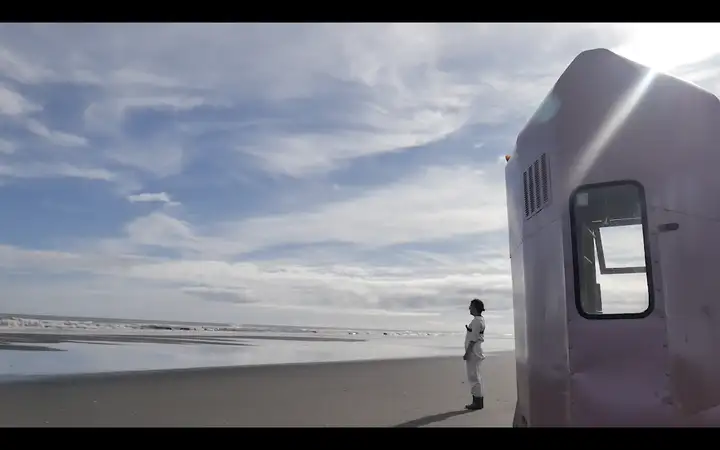
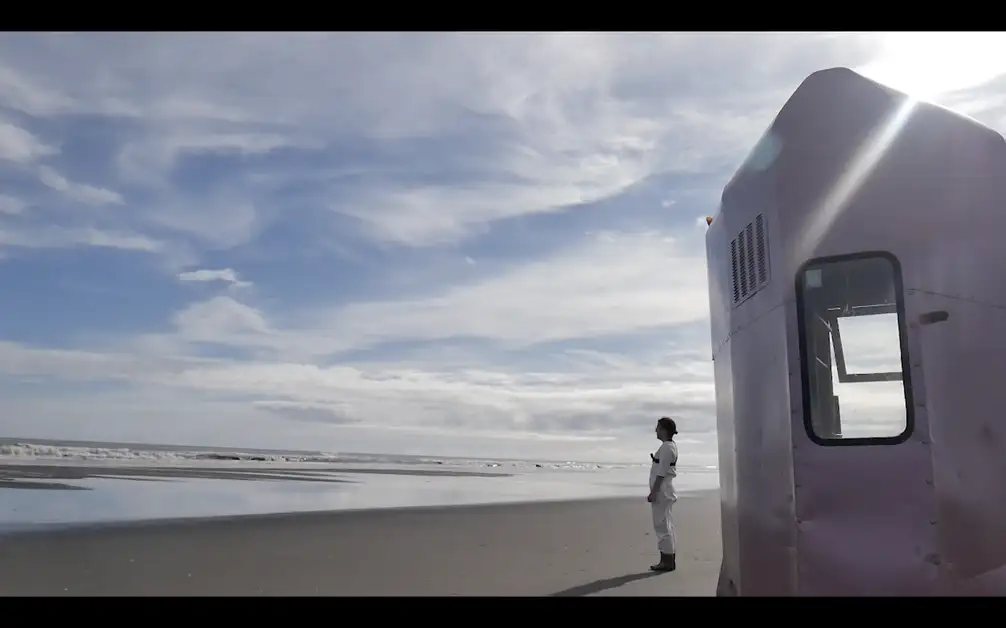
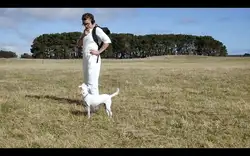
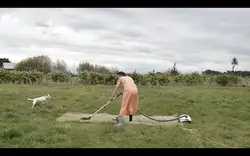
From childhood to PhD
Dr Ora’s research has roots in her childhood experiences along the Ōroua River, where a fleeting moment when paddock fences appeared strange in the landscape sparked a lifelong curiosity about land and its relationship to settlers. This moment disrupted her assumptions about land, raising questions around settler control and perception.
Dr Ora’s art practice has remained connected to the outdoors—engaging in playful, physical activities that reflect her childhood memories of climbing trees and building huts.
A pivotal moment in her doctoral journey was living off the grid in The Chrysalis—a repurposed horse float transformed into a micro-house, in Tangimoana. This experience was crucial in shifting her perspective of land from ownership to that of a guest, and allowed her to experience land as a living entity, inspiring her research and creative practice.
One of the most significant insights in her research came from the realisation of how small, sustained actions can accumulate over time. A key moment occurred during the making of Projection Screen, where Dr Ora filmed herself unfurling a projection screen in an overgrown backyard. This act amplified her questions about how colonial projections shape our relationship with land.
Rather than focusing on direct resistance, her work embraced a gentle approach, focusing on subtle, persistent engagements with land that disrupt colonial narratives over time.
Dr Ora’s research also led her to embrace the concept of “affirmative resistance,” where small, everyday acts of connection gently shift cultural and colonial norms. By focusing on generative practices that reshape relationships with land, she found that transformation need not always come through grand gestures, but through ongoing, subtle engagements.
Dr Ora’s research has real-world implications, particularly in decolonial education, environmental awareness and artistic activism. Her work demonstrates how performance art can be a vital tool in unsettling colonial narratives and reshaping identity and belonging. By using small, absurd and playful gestures, her art shows that transformation can emerge through cumulative disruptions, rather than grand acts.
This approach offers a new way to critically engage with space, history and identity, encouraging collective reflection on how settlers can engage with whenua without perpetuating colonial harm. Through making her performances visible, Dr Ora opens up space for conversations about belonging, responsibility and the cultural construction of landscape, inviting others to reflect on their own relationships to land in Aotearoa.
Memorable moments at Massey
Dr Ora has fond memories of her time at Massey, especially the support and guidance from her supervisors, Professors Kingsley Baird and Julieanna Preston. She recalls how they helped her navigate the highs and lows of the PhD process.
“I valued being among high-calibre artists and researchers in an environment where art-making and critical thinking were the norm. I have great memories of our cohort and lasting friendships from this time. The workshops were amazing, as are the technical staff.
“A highlight of my Massey experience was early morning coffees with Karl, the head custodian, and the ways some of my cohort unwound – like goofing around in discarded fashion student outfits from the skip bin. I also remember eerie late-night walks through the old museum building, crossing paths with others working into the night.”
Looking ahead
Now that her doctoral research is complete, Dr Ora is excited about upcoming collaborations with artists and is deeply enjoying her te reo Māori classes.
“I feel very fortunate to be part of a Māori-led community course focused on Te Ao Māori and tikanga foundations, which has been bringing me a strong sense of community and grounding. Alongside this, I have noticed that my life has taken on a more relational focus, and many aspects of my research are now becoming part of how I live. I’m self-employed, running a small cleaning business, and I’m also in the process of setting up a workshop. With these commitments and upcoming artistic collaborations, life is keeping me busy in the best way.”
Related news
New lifejacket design more fit for purpose for flood events in India
Doctor of Philosophy graduate Dr Areef Shaik saw a real need for a more fit for purpose lifejacket for emergency responders in India, where flood events occur every year due to the tropical monsoon climate.
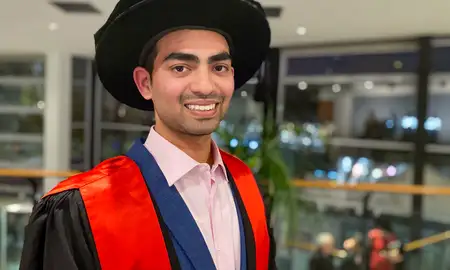
Smoosh – a flatpack shoe designed for a digital nomad lifestyle
Dr Magdalena Karasinska’s nomadic experience served as a valuable starting point for her creative and practice-led research PhD project called ‘Smoosh.’
